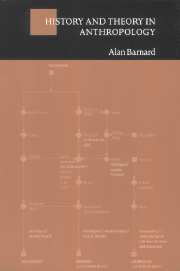Book contents
- Frontmatter
- Contents
- List of figures
- List of tables
- Preface
- 1 Visions of anthropology
- 2 Precursors of the anthropological tradition
- 3 Changing perspectives on evolution
- 4 Diffusionist and culture-area theories
- 5 Functionalism and structural-functionalism
- 6 Action-centred, processual, and Marxist perspectives
- 7 From relativism to cognitive science
- 8 Structuralism, from linguistics to anthropology
- 9 Poststructuralists, feminists, and (other) mavericks
- 10 Interpretive and postmodernist approaches
- 11 Conclusions
- Appendix 1 Dates of birth and death of individuals mentioned in the text
- Appendix 2 Glossary
- References
- Index
9 - Poststructuralists, feminists, and (other) mavericks
- Frontmatter
- Contents
- List of figures
- List of tables
- Preface
- 1 Visions of anthropology
- 2 Precursors of the anthropological tradition
- 3 Changing perspectives on evolution
- 4 Diffusionist and culture-area theories
- 5 Functionalism and structural-functionalism
- 6 Action-centred, processual, and Marxist perspectives
- 7 From relativism to cognitive science
- 8 Structuralism, from linguistics to anthropology
- 9 Poststructuralists, feminists, and (other) mavericks
- 10 Interpretive and postmodernist approaches
- 11 Conclusions
- Appendix 1 Dates of birth and death of individuals mentioned in the text
- Appendix 2 Glossary
- References
- Index
Summary
The poststructuralists, feminists, and mavericks described in this chapter have in common a desire to move away from the more formalist ideas of functionalism and structuralism towards a looser, yet more complex, understanding of relations between culture and social action. The growing interest in power is represented in many of the works touched on here as well.
Poststructuralism occupies an ambiguous position in anthropology. On the one hand, it is in essence a critique of structuralist thought played out mainly in structuralist terms. That is, the poststructuralists, who have practised mainly outside social anthropology (in philosophy, literary criticism, history, and sociology), have offered critiques of Lévi-Strauss and other declared structuralist writers. At the same time, poststructuralists have pointed the way to the explanation of action, the scrutiny of power, and the deconstruction of the writer as a creator of discourses. Thus poststructuralism touches on the interests of transactionalists, Marxists and feminists, and postmodernists alike. In a loose sense, poststructuralism is a form of postmodernism, as structuralism is the primary form of ‘late modernism’ in anthropology (see chapter 10).
Feminism has its main roots in substantive, as opposed to grand theoretical, issues of sex roles and gender symbolism. However, over the last twenty years it has achieved the status of a theoretical paradigm not only in the substantive area of gender studies, but also more widely in anthropology.
- Type
- Chapter
- Information
- History and Theory in Anthropology , pp. 139 - 157Publisher: Cambridge University PressPrint publication year: 2000



